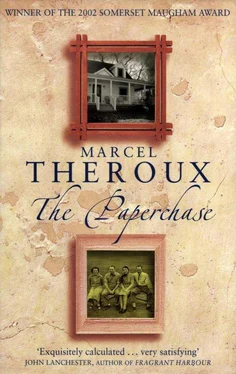I have never been back to Ionia. I relinquished my interest in the estate and every year get a Christmas card from the two old priests who now live there. Father Donovan is the name of one of them. I can never read the other man’s signature.
For a while I was so busy trying to put a life of my own together that I thought very little about Patrick, although I was always reminded of him when I saw that old guy outside Baker Street tube station dressed as Sherlock Holmes and handing out brochures to the museum.
Then Mr Diaz wrote to me two years ago. He needed my permission to open the house to one of Patrick’s prospective biographers. I gave it, figuring that some lucky postgraduate student was welcome to make what sense he could out of the penny-banks, the ice-cream scoops, the crazy letters, and the unpublished writings. It’s not a boast to say I was the only person capable of following Patrick’s paper chase right through to its conclusion.
The biographer, Edwin Sapsted (D. Phil., Oxon.) has been in touch with me a couple of times over the past twelve months. He E-mailed me lists of questions on matters of chronology, stuff about the history of the house, and Patrick’s relationship with my father.
I decided to be helpful but not too helpful, because although I wanted to unburden myself, I didn’t feel right about it, even with my father and Patrick both dead. So I fended off his inquiries and when he asked me about Mycroft Holmes I told him all the books he needed were in Patrick’s library. I didn’t tell him my own conclusions about the stories. But his curiosity piqued something inside me, and I found my thoughts drawn back to Ionia.
I think the imagination roams widely over the world until it finds a predicament that reflects its own secret agonies. And if it lacks the will to move on, it roosts and broods, and pecks at old injuries. Mycroft can nail half of London Bridge to that barrel as ballast, but nothing will stop Abel Mundy’s restless ghost pursuing him into his dreams.
Because the ugly secret of that final story — and of this story, perhaps of all stories — is that the author ultimately identifies with his villain. Abel Mundy, violent husband and failed parent, is a grotesque, but strip away the calumnies and he is only a husband and a parent — and I think that is why Mycroft murders him.
It’s very late. Going over all this for the last time before I set it aside for ever, I see that I’ve tried many ways to approach Patrick — through the facts of his life, and his work, and the gaps in his work, and the impress of his personality upon the house and island that he definitely loved — and yet in the end, he has eluded me. Whatever he was, he is now too insubstantial for me to grasp, except fleetingly.
Mycroft comes closest to embodying something of him, but in spite of everything that Patrick wrote, Mycroft also remains frustratingly absent. So I’m resigned to the idea that my final approach to Patrick is a qualified failure. And after all, there is a quiet poetry in Mycroft’s absence. It echoes the life of another absent man, someone who perhaps resembled his creations — Mycroft, Abel Mundy and the innocent protagonist of Peanut Gatherers — but who was, principally and biologically, my father, Patrick March.
Marcel Theroux is the author of five novels, A Blow to the Heart, A Stranger in the Earth, The Paperchase , winner of the 2002 Somerset Maugham Award, Far North which was short-listed for the America’s prestigious National Book Award, and Strange Bodies . He lives in London.












